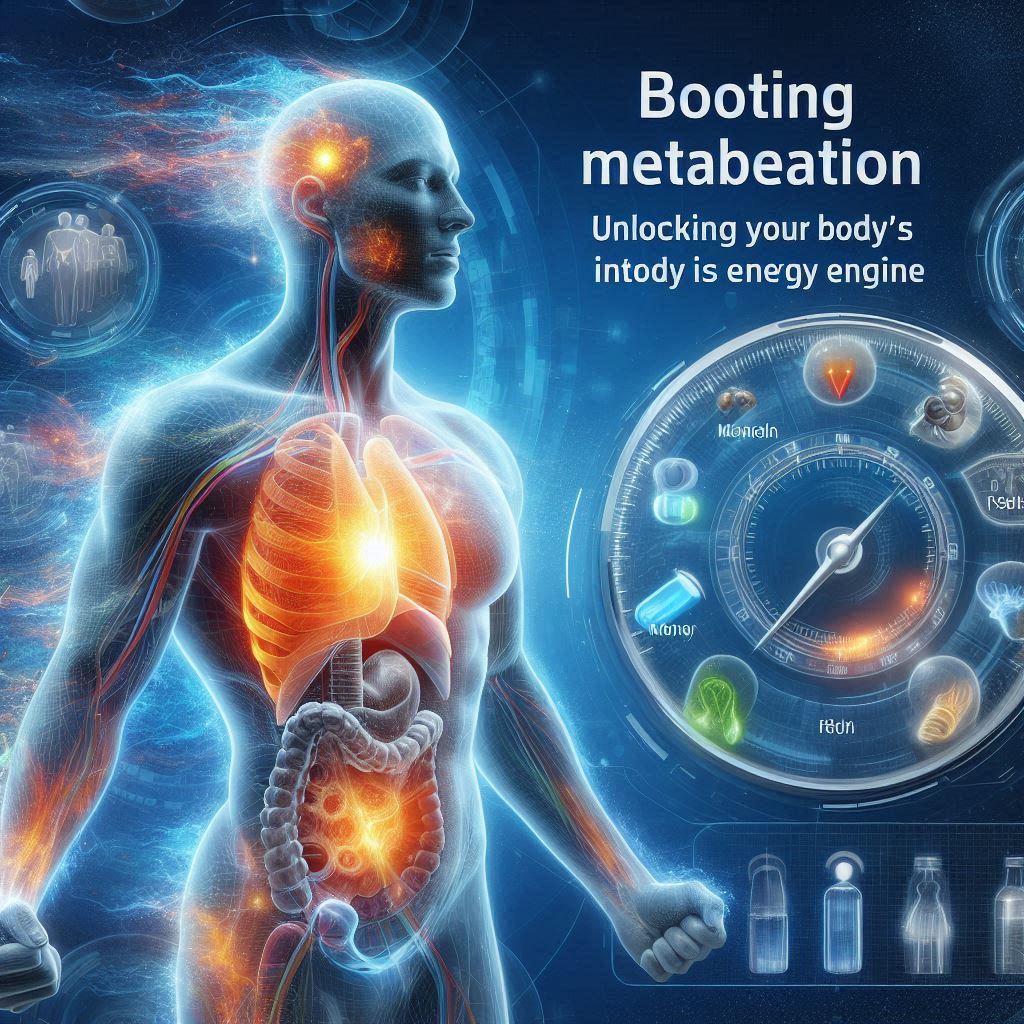Metabolism plays a crucial role in determining how efficiently our bodies convert food into energy and how we burn calories. Whether you’re looking to lose weight, increase energy levels, or improve overall health, understanding and optimizing your metabolism can be a game-changer.
Metabolism is the process by which the body converts the food and beverages we consume into energy. Even at rest, your body requires energy for breathing, circulating blood, repairing cells, and all other basic functions. The speed at which this happens is referred to as your metabolic rate, and it varies from person to person based on factors like age, genetics, and body composition. However, there are strategies you can employ to give your metabolism a natural boost.

Understanding Your Metabolism
Before diving into the ways to boost metabolism, it’s important to understand the two main components:
- Basal Metabolic Rate (BMR): This is the number of calories your body needs to perform basic functions at rest. BMR accounts for about 60-75% of the total calories burned each day.
- Active Metabolism: This includes the calories burned through physical activity, digestion, and even activities like walking or fidgeting. Active metabolism varies greatly depending on a person’s lifestyle and exercise habits.
Together, these components determine how fast your body burns calories, which in turn affects energy levels, weight management, and overall health. While genetics play a significant role in metabolic rate, there are natural ways to give your metabolism a healthy boost.
1. Building Muscle to Burn More Calories
One of the most effective ways to increase your metabolic rate is through strength training and building muscle mass. Muscles burn more calories at rest than fat, meaning that the more muscle you have, the more calories your body will burn throughout the day.
How it works:
Muscle tissue requires more energy to maintain than fat tissue. After a strength-training workout, your muscles repair themselves and grow stronger, which increases your resting metabolic rate. This is called the afterburn effect or excess post-exercise oxygen consumption (EPOC), which means that your body continues to burn calories even after your workout has ended.
Incorporating weight lifting, bodyweight exercises, or resistance training into your fitness routine at least 2-3 times a week can significantly boost your metabolism over time.
2. Eat Enough Protein
Your diet plays a critical role in metabolism, and protein is particularly important when it comes to boosting metabolic rate. The body uses more energy to digest and process protein compared to carbohydrates and fats. This is known as the thermic effect of food (TEF).
Why it matters:
Eating protein-rich foods can increase your metabolism temporarily by 15-30% due to TEF. Protein also helps preserve muscle mass during weight loss, ensuring that your body burns fat rather than muscle for energy.
Some excellent sources of protein include:
- Lean meats (chicken, turkey, beef)
- Fish and seafood
- Eggs
- Dairy products (Greek yogurt, cottage cheese)
- Plant-based sources (beans, lentils, quinoa, tofu)
Eating small amounts of protein with every meal can help stabilize blood sugar levels, reduce cravings, and keep your metabolism revving throughout the day.
3. High-Intensity Interval Training (HIIT)
If you’re looking for an efficient way to boost metabolism, High-Intensity Interval Training (HIIT) is a powerful tool. HIIT involves short bursts of intense exercise followed by brief periods of rest or lower-intensity activity. This type of training is known to enhance calorie burn, improve cardiovascular health, and increase metabolic rate.
How it boosts metabolism:
HIIT creates a greater afterburn effect compared to steady-state cardio. The intense intervals push your body to burn more calories during the workout, and because of the exertion, your body continues to burn calories after the workout is over.
Examples of HIIT workouts include sprinting, cycling, or bodyweight exercises like burpees, jump squats, and push-ups. Just 20-30 minutes of HIIT a few times a week can yield significant metabolic benefits.
4. Stay Hydrated
Water is essential for optimal metabolic function. Every chemical reaction in the body, including the breakdown of food into energy, requires water. Dehydration can slow down your metabolism and make it harder for your body to process food efficiently.
Tip:
Drinking water, especially cold water, can temporarily boost metabolism by forcing your body to expend energy to heat the water to body temperature. Studies have shown that drinking 16 ounces of cold water can increase your metabolic rate by up to 30% for about an hour.
Aim to drink at least 8-10 glasses of water a day to keep your body hydrated and support a healthy metabolism.
5. Eat Small, Frequent Meals
Skipping meals or dramatically reducing calorie intake can lead to a slowdown in metabolism. When the body goes into starvation mode, it conserves energy by slowing down the metabolic rate. To keep your metabolism functioning at its best, try eating smaller, more frequent meals throughout the day.
How it helps:
Eating every 3-4 hours can prevent blood sugar dips and spikes, and keep your metabolism stable. Focus on nutrient-dense, balanced meals that include a combination of protein, healthy fats, and complex carbohydrates.
While some studies have debated the benefits of frequent meals, the key is to avoid overeating or undereating. Moderation and balance are essential for maintaining a steady metabolic rate.
6. Get Enough Sleep
Sleep plays a vital role in regulating metabolism. Poor sleep is linked to an increased risk of obesity, insulin resistance, and a slower metabolic rate. When you don’t get enough sleep, your body produces more ghrelin (the hunger hormone) and less leptin (the hormone that signals fullness), leading to increased hunger and cravings.
How sleep affects metabolism:
A lack of sleep can lead to decreased energy expenditure and less physical activity, contributing to weight gain. Ensuring 7-9 hours of quality sleep per night supports hormonal balance, reduces stress, and helps maintain a healthy metabolism.
7. Drink Green Tea or Coffee
Both green tea and coffee have been shown to boost metabolism due to their caffeine content. Caffeine increases the release of adrenaline, which stimulates fat burning and calorie expenditure.
Why it works:
Green tea contains antioxidants called catechins, which work with caffeine to enhance the fat-burning process. Studies suggest that consuming green tea or coffee in moderation can increase metabolic rate by 3-11%.
However, be mindful of excessive caffeine consumption, which can lead to jitteriness, anxiety, or disrupted sleep.
Conclusion
Boosting metabolism is not about quick fixes but rather adopting sustainable lifestyle changes that support your body’s natural energy systems. By incorporating strength training, eating protein-rich meals, staying hydrated, engaging in HIIT, and prioritizing sleep, you can unlock your body’s energy engine and achieve long-term health and vitality. Remember, small, consistent efforts can lead to lasting results when it comes to optimizing metabolism and improving overall well-being.
